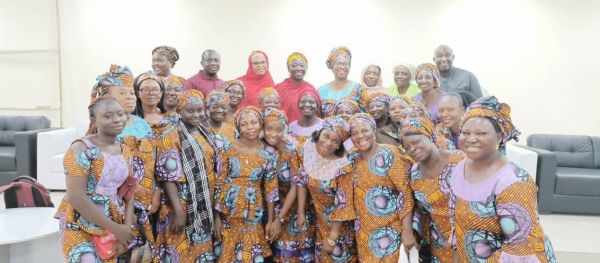The Justice for Widows, a non-profit organization, held another inclusive conference on the 18th of August 2023, with a focus on how to better the lives of widows, push for better media coverage and policy changes.
The Justice for Widows Press Conference was birthed following research and work at the Walk With Widows Initiative.
It was then realised that to end disinheritance, disenfranchisement, and the dehumanizing rites and rituals some widows are forced to go through, there was a need to get all stakeholders on board and look beyond the immediate environment to seek alliance toward a better life for widows.
The convener of the conference, Dr. Omolola Omoteso welcomed everyone to the conference, which is the fifth edition.
Also Read:
- Shettima extols UBA’s dedication to innovation, emerging markets
- Breaking: CBEX: EFCC declares eight foreigners, Nigerians wanted
- Leakage of National Assembly roof confirmed during downpour
- Rivers: Ex-Deputy Speaker prays court to sack Sole Administrator
- ‘C & S Church’ with human parts uncovered, three arrested
Omoteso shared insights into the issue of widow abuse and the objectives of the conference which began in 2020.
All participants who shared goodwill messages partnered with widows and widow-focused organizations. They all identified with the plight of widows and the power of resilience.
They further acknowledged the work done by the civil societies focused on widows and showed appreciation for the sacrifice of all who continue to push against the tide including the Walk With Widows Initiative under the leadership of Dr. Omolola Omoteso.
This was followed by the stories of struggle and survival by widows.
The stories by Efemena Ogundana, Adetutu Banjo, Ayakpat, and Omonike Olatoke pointed to the myriad of abuse, abandonment, and neglect that widows go through and for which legal redress is only available to the top earners.
Omoteso updated members on the need for policy change and legal reforms to ensure that justice is served to widows, welfare was taken care of through initiatives like the Ministry for Widow Affairs or Agency for Widows, and widow abuses are criminalized to serve as a deterrent.
She also shared essentials to know in times of crisis including self-care. The three-part sessions were collapsed into one for robust discussion.
On what has worked and has not worked for NGOs, the following were indicated; challenges with fundraising, many focusing on feeding and clothing rather than empowerment and policy change.
There is the issue of partnerships that have worked, media advocacy and reaction, and widows’ preference for silence has worked against the cause.
Another point raised at the conference was on the challenges widows face and the likely ways out.
One of the challenges mentioned is that discrimination has led to widows being denied access to rent or lease.
There is the challenge of the belief that associating with widows could lead to becoming widowed. It was noted that many people including family and friends abandon windows as if widowhood is a contagious disease
There is the problem of the reality of death and the need for those yet to experience widowhood to prepare rather than discriminate.
Some widows, it was agreed, have a sense of entitlement, which has made them act as beggars.
The importance of joining credible groups like Walk With Widows and Widows Rejoice Mission was stressed as an avenue that could help widows.
Other challenges mentioned are; lawyers fleecing widows or compromising, and the lack of real activists and advocates to assist free or pro bono.
Another problem is connected to activists, advocates, attorneys, and journalists and the way out. On this issue, the discussants noted that journalists often complained of the lack of access to widows to interview, which can be mitigated by media partnerships with NGOs.
Another challenge is the policy that court cases cannot be processed or published by the media, which the discussants said was discriminatory because cases like electoral issues in court still gain media publicity.
The question is, how can this be changed to favour widows who often do not have money to engage attorneys and therefore often lose cases?
There are issues of reportage of issues relating to widows not taken or accepted with passionate interest by media houses and some journalists are said to have been targeted for covering reports on widows.
According to the discussants, there is a need for stories that focus on policy change and achieving legal, judicial, or executive reform that will end the disinheritance, discrimination, and dehumanization of widows through rites and rituals.
A call to action widows and others in attendance were encouraged to see and share that, widowhood is not a curse, those who are married need information to protect themselves from abuse when spousal death happens
There needs to be a shift and push toward achieving legal, judicial, or executive reform that will end the disinheritance, discrimination, and dehumanization of widows.
Organizations need to seek funding and collaborate. Consideration should be given to having communication, counselling, and consultancy offices in ministries of women’s affairs. This, it was emphasized, can be supported virtually and in person by members of Walk With Widows.
The speakers also said: “It is important to seek legal reform that strengthens the marriage certificate. Under the law individuals who enter into business as partners have the legal right to carry on when one partner dies. Rather than insisting on a Living Will, the strengthening of the marriage certificate means the living spouse can carry on using legally approved wealth distribution models.
“Supporting widows and their children can mitigate kidnapping and terrorism as children of unsupported widows and orphans can become easy targets for criminals and gangs.”


